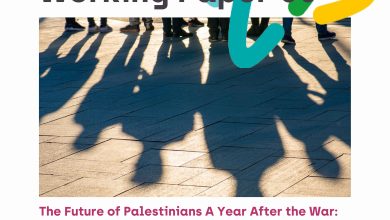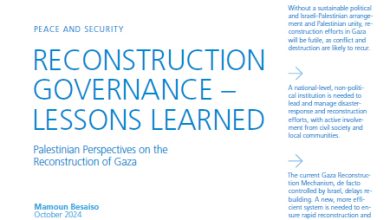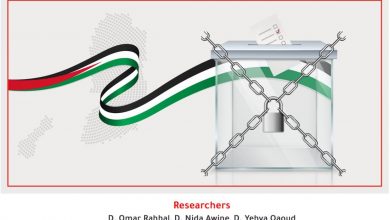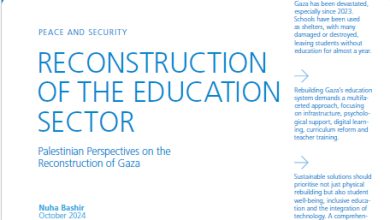A Conference on “The Gaza Blockade: Addressing Consequences and Recovery Strategies”
[gn_note color=”#fdf3b2″]
Urgent Efforts are Needed from the International Community to end the Gaza Blockade
[/gn_note]
[highlight]Monday 22nd, Oct, 2012-Gaza[/highlight]
In cooperation with the Heinrich Böll Stiftung, Pal-Think for Strategic Studies held a conference entitled “The Gaza Blockade: Addressing Consequences and Recovery Strategies “.Civil society representatives, analysts, academics and other interested stakeholders attended. The conference aimed focused on strategies to overcome the main economic and political challenges in the Gaza Strip, specifically regarding the higher education sector, the private sector, and women issues.
Mr. Omar Shaban, director of Pal-Think for Strategic Studies, opened the conference and emphasized the importance of highlighting these sectors especially after almost 6 years of the tight blockade on the Gaza Strip. Dr. Wildangel introduced the Heinrich Böll Foundation which is a part of The German Green movement and affirmed the importance of organizing such conferences to remind the international community of the bad effects the blockade causes and the necessity of pressing for political initiatives. Mr. Alexei Maslov, director of the UNESCO Office in Gaza and representative of Mr. Robert Serry, Special Representative and Head of the United Nations Office, focused on the recently published UN “Gaza 2020” report, which was presented by Mr. Serryin a Security Council session. The report paints a bleak picture of the future of the Gaza strip and its mainly young population if inaction continues.
In the conference, three papers on the impact of the blockade on the higher education sector, the private sector and women issues were presented:
Dr. Khaled Safi, professor of history at Al-Aqsa University, presented the impact of the siege on the Higher Education Institutions in the Gaza Strip. He talked about how the siege affects the universities and colleges in Gaza along with the last Israeli military offensive on the Gaza Strip. Many academic projects now lack support or cannot be implemented because of the situation on the ground.
During presenting his paper, Dr. Safi also talked about the difficulties the academics and the students face in completing their graduate studies and research activity. There is also a decline in cultural and academic activities in the Gaza Strip due to the growing isolation and the difficulties in communicating with the West Bank, Jerusalem and the whole world beyond Palestine. The lack of funding, restriction of movement and the decline of the public sphere affect the higher education of students in Gaza .Dr. Safi gave several concrete recommendations, among them:
- Providing the educational institutions with adequate support and cancel funding restrictions.
- Rebuilding the Higher Education Institutions’ buildings that were damaged in the last offensive on the Gaza Strip.
- The establishment of adequate facilities for higher education institutions to avoid the overcrowding in the classrooms.
- Promoting scientific research, and the establishment of appropriate infrastructure of traditional and electronic libraries.
- Ending Palestinian division as a central step to end its devastating effects on the Palestinian higher education institutions, especially in Gaza.
Mrs. Reham Al Wehaidy, Chairperson of Al Athar Global Consulting, Inc, talked about the impact of the Gaza blockade on the Palestinian private sector. She explained the deterioration of the private sector due to blockade on one hand and the political division on the other hand. Since the closure of some tunnels with Egypt the newly established “tunnel economy” has also dropped by 30%. Incoming Qatari investments might revive the construction and infrastructure sectors, but will not contribute to the reestablishment of a sustainable economy, which would need some of the following steps Al Wehaidy recommended:
- Pressure to end the Gaza blockade which continues to obstruct the growth of the private sector.
- Empower the leading organizations representing the private sector.
- Pay special attention to the development of sectors that are able to generate the highest number of employment opportunities.
- Develop a strategy to change from pure relief projects to projects that support private sector growth.
Mrs. Heba Zayyan, researcher in the field of development and women, affirmed that the crisis in the Gaza Strip is not of a humanitarian nature. However, it is a “Human Crisis” facing challenges inhuman rights, liberty, dignity, basic living conditions, etc. An urgent need is the participation of women in attempts to overcome this crisis. Political participation of women is extremely low in Gaza, also compared to their economic and social participation. Especially after the events of 2006 and 2007, women could not play a significant role due to the halt of legislative work in the Gaza strip. In addition, many of committees working on reconciliation did not include women. Zayyan identified violence against women as one of the most serious and widespread problems in Gaza (and the West bank). In this regard, Zayyan suggested the following recommendations:
- The necessity of Palestinian reconciliation efforts to include women and to enforce women’s political empowerment.
- Unifying efforts of the women movement and organizations working on gender equality.
- Incorporating international legislation on women’s rights in the Palestinian discourse.
- Establish women quotas in the political parties.
Papers:
First Paper: Dr. Khaled Safi, Associate Professor of History at Alaqsa University.
![]() [highlight]The Impact of the Gaza Blockade on the Higher Education Sector[/highlight]
[highlight]The Impact of the Gaza Blockade on the Higher Education Sector[/highlight]
Second Paper: Mrs. Reham Al Wehaidy, Chairperson of Al Athar Global Consulting, Inc.
![]() [highlight]Private Sector: Impact of the Gaza blockade and strategies to cope with the consequences[/highlight]
[highlight]Private Sector: Impact of the Gaza blockade and strategies to cope with the consequences[/highlight]
Third Paper: Mrs. Heba Zayyan, Researcher in development and women affairs
![]() [highlight]The Gazan Women’s Context: Challenges and Opportunities[/highlight]
[highlight]The Gazan Women’s Context: Challenges and Opportunities[/highlight]






